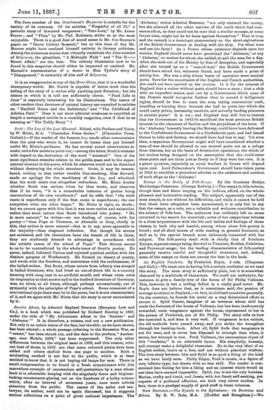Scott The Lay of the Last Minstrel. Edited, with Preface
and Notes, by W. Minto, M.A. "Clarendon Press Series." (Clarendon Press, Oxford.)—If the reader of the famous Lay needs other commentator than the poet who wrote it, he cannot do better than pat himself under Mr. Minto's guidance. He has several sound observations to make, and a few errors to point out,—among the latter, Scott's mistake with regard to the derivation of the word "minstrel." One of his most significant remarks relates to the goblin-page and to the super- natural element in the poem, which he observes could not be detached without destroying the whole structure. Scott, it may be remem- bered, writing to that rather terrible blue-stocking, Miss Seward, made an apology for the machinery of the Lay, and admitted that the sixth canto was altogether redundant. Mr. Minto doubts whether Scott was serious when he thee wrote, and observes that if he were, "it is a remarkable instance of genius being unconscious of its own excellence;" and he adds that "the sixth canto is superfluous only if the first canto is superfluous; the one completes what the other began." Mr. Mints is right, no doubt ; but we cannot agree with him that it was more action and animation rather than more nature that Scott introduced into poetry. "Ms is more natural," he writes—we are dealing, of coarse, with his poetry—" than Pope or Thomson, or Akenaide or Gray, chiefly in this, that action is more natural—that is to say, more agreeable to the majority—than stagnant reflection. But though his scenes are animated, and his characters have the breath of life in them, they are studiously dressed to advantage in accordance with the artistic canon of the school of Pope." This dictum seems to us to be contradicted by the whole tenor of Scott's poetry. He never, indeed, followed Nature and rejected poetical artifice with the distinct purpose of Wordsworth. He formed no theory of poetry, and wrote with the freedom, and sometimes with the reckleesness, of the ballad-writer. But Scott, whose nature from infancy was steeped in ballad literature, who had lived an oat-of-doors life in a country teeming with song cast in no artificial mould, and whose verse owes its inspiration to that source and to the kindred literature of Germany, was, we think, at all times, although perhaps unconsciously, out of sympathy with the principles of Pope's school. Some ornament of a conventional type there may be in the poem, but it is not characteristic of it, and we agree with Mr. Minto that the story is never encumbered by it.


































 Previous page
Previous page